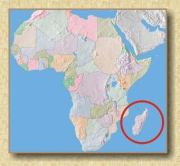For 18 days we volunteers were consolidated at a beachfront hotel in Antalaha. The sun beamed for most of the time and we listened to the Indian Ocean’s crashing waves from our rooms. The Peace Corps gave us money to eat at the hotel’s restaurant, so we indulged in luxurious foods like coconut shrimp, chocolate mousse, pizza and crab. During this time we read books, took long afternoon naps, listened to music and wrote in our journals.
But our consolidation period was far from relaxing. As we wiled away the 18 days we didn’t know what would happen to us. It was possible that at any moment the Peace Corps would call us and report that we’d be leaving Madagascar forever, and it was equally possible that we’d return to our villages and our work. We received daily text messages from the Peace Corps’ security officer that reported the news: the mayor of Antananarivo declaring himself President of Madagascar and creating an alternative national government, the opposition storming the presidential palace, the military shooting and killing over 20 protestors in the capital, airplanes set aflame elsewhere, crowds fleeing from tear gas and grenades, more lootings and violence. Each day we were certain to be returning to America, and then we’d receive a text message giving us hope of returning to our villages, but then only to be dashed by a second and contrary text message. Antalaha’s beautiful beach setting and our luxurious meals were always tainted by the thought that we could soon be leaving Madagascar.
I’m writing to you from Sambava. Most Peace Corps Madagascar volunteers have been cleared to return to their villages. From what I’ve gathered, however, many volunteers are still bracing for evacuation. While most of Madagascar is presently peaceful, the political crisis at the capital has not finished. The crisis could intensify; we could be removed from our villages again. Today I’m returning to my village with the hope that I’ll spend the rest of my Peace Corps service there. It has become a home to me—a very happy home—and I would hate to leave it.



 Posted by Jordan Butler
Posted by Jordan Butler 


